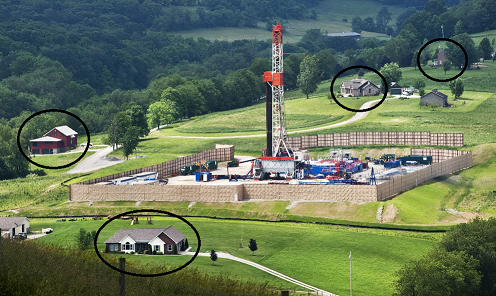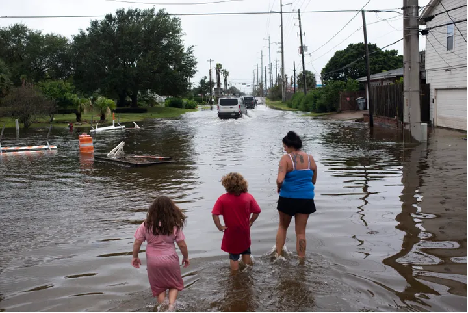Scientists Find Fracking Contaminated Wyoming Water After EPA Halted Study
April 14, 2016New York Denies Critical Permit for Natural Gas Pipeline
April 27, 2016By Don Hopey, Pittsburgh Post-Gazette, April 18, 2016 Two environmental organizations will ask the state’s Office of Environmental Justice to review Range Resources’ past and future shale gas development practices to determine if the company has avoided drilling in wealthier neighborhoods and targeted poorer areas of the state.
The Center for Coalfield Justice and the Pennsylvania Chapter of the Sierra Club raised that question after they said Terry Bossert, Range’s vice president for legislative and regulatory affairs, told a Pennsylvania Bar Institute gathering in Harrisburg earlier this month, that the company tries to avoid siting its shale gas wells near “big houses” where residents might have the financial resources to challenge the industrial-type developments.
“We heard Range Resources say it sites its shale gas wells away from large homes where wealthy people live and who might have the money to fight such drilling and fracking operations,” said Patrick Grenter, an attorney and Center for Coalfield Justice executive director, who attended the lawyers’ forum. A handful of attorneys in the audience confirmed that account
Joanne Kilgour, an attorney and director of the Pennsylvania Chapter of the Sierra Club, who attended the meeting, said Mr. Bossert’s statements “pose significant environmental justice issues, and raise the question whether the companies coming into communities are really operating in the best interests of those communities.”
Mr. Grenter said the environmental groups will send their letter today requesting that the state Department of Environmental Protection’s Office of Environmental Justice review Range’s well- siting permits to determine if drilling operations have been disproportionately located away from wealthier homes and neighborhoods.
According to the letter, a copy of which was provided by Mr. Grenter, “Mr. Bossert’s comments serve as actual notice of the need to implement policies and practices that protect these communities from the adverse effects of industrial land uses.”
Mr. Bossert, who was DEP chief counsel from 1995 to 1999, did not respond to several interview requests last week. He made the remark on April 7, during his PowerPoint presentation at the PBI Environmental Law Forum, in a session titled “Environmental Issues Facing the Oil and Gas Industry.” The comment was not part of the talking points on the PowerPoint slides.
Matt Pitzarella, a Range spokesman, characterized Mr. Bossert’s siting comment as “sarcastic” and “facetious,” and said it was meant to underscore “how hard we work to site our locations in the best possible place for residents and the community.”
Mr. Pitzarella, who did not attend the forum, also said via email that topography, geology, setback regulations and lease requirements are factors in the company’s well-siting decisions, and “within those factors we always select sites that are the most ideal for property owners and residents.”
But Mr. Grenter, who questioned Mr. Bossert at the forum about his comments, said it didn’t appear that the statement was made in jest. Several of those in attendance confirmed that, and said Mr. Bossert prefaced the remark with, “To be perfectly frank …”
“I was astounded at the environmental injustice that statement conveyed,” Mr. Grenter said. “There were industry attorneys sitting behind me who gasped.”
“My personal take on it, and I don’t think there’s another way to interpret it, is that people with fewer resources to challenge the industry are the ones being targeted for well development,” said Logan Welde, staff attorney for the Clean Air Council, who heard Mr. Bossert speak. “I don’t really think it’s a secret that the industry is doing this, but to be so bold to publicly state that is just so brazen and just shows how confident the industry is in the state.”
Although Pennsylvania has had an environmental justice office since 2002, its oversight duties have regularly suffered from understaffing. And prior to October 2015, shale gas well-drilling permits were not one of the state permits that triggered an environmental justice review.
“[The EJ office] wasn’t functioning before. We looked at it as an opportunity to do the work in a different way,” DEP Secretary John Quigley said in a phone interview last week.
He said he’s in the process of “reconstituting” the EJ office, that all new oil and gas permits now automatically trigger environmental justice reviews, and that environmental justice considerations will guide all of his department’s actions and decision-making.
The office has identified more than 850 environmental justice communities statewide, a designation that applies if at least 20 percent of the population is living below the poverty line or 30 percent are non-white. As of this month, 514 of the 9,713 shale gas wells drilled in the state since Jan. 1, 2000 were drilled in designated “EJ” communities, according to Fractracker Alliance, an independent nonprofit headquartered in Camp Hill, Pa., that maps and collects data on oil and gas industry operations.
Carl Jones Jr., a Philadelphia attorney appointed by Mr. Quigley in October to head the EJ office, said he’s in the process of developing a better, more nuanced way to enforce environmental justice policy by taking a closer look — “an eyeball test” — at all development activities, not only oil and gas drilling.
“The notion behind a holistic environmental justice policy,” he said, “is to prevent individual groups from bearing a disproportionate share of environmental impacts.”
Mr. Quigley said he hopes to have a draft of new environmental justice review procedures available for public comment by late summer or early fall.




